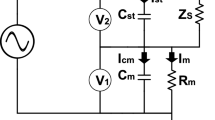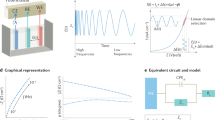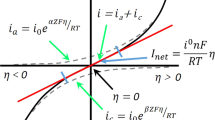Abstract
THE dropping mercury electrode can be used for oscillo-polarography1 but the oscillo-polarograms obtained during the investigation of organic compounds are often difficult to interpret.
This is a preview of subscription content, access via your institution
Access options
Subscribe to this journal
Receive 51 print issues and online access
$199.00 per year
only $3.90 per issue
Buy this article
- Purchase on Springer Link
- Instant access to full article PDF
Prices may be subject to local taxes which are calculated during checkout
Similar content being viewed by others
References
Heyrovsky, J., and Forejt, I., “Oscilograficka polarografie” (Prague, 1953).
Kemula, W., and Kublik, Z., Anal. Chim. Acta, 18, 104 (1958).
Kemula, W., and Kublik, Z., Roczniki Chem. (in the press).
Author information
Authors and Affiliations
Rights and permissions
About this article
Cite this article
KEMULA, W., KUBLIK, Z. Observation of Transient Intermediates in Redox Processes by Variable Voltage Oscillo-polarography and Cyclic Voltammetry. Nature 182, 793–794 (1958). https://doi.org/10.1038/182793a0
Issue Date:
DOI: https://doi.org/10.1038/182793a0
This article is cited by
-
Polarography—past, present, and future
Journal of Solid State Electrochemistry (2011)
-
Cyclic Alternating-Current Voltammetry with a Platinum Electrode
Nature (1959)
Comments
By submitting a comment you agree to abide by our Terms and Community Guidelines. If you find something abusive or that does not comply with our terms or guidelines please flag it as inappropriate.



